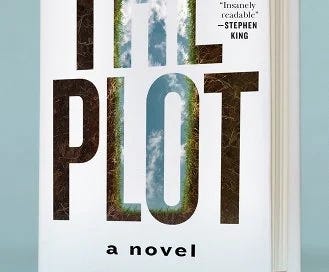Read: September 2024
Published: May 2021
Summary
Jacob Finch Bonner was once a promising young novelist with a respectably published first book. Today, he’s teaching in a third-rate MFA program and struggling to maintain what’s left of his self-respect; he hasn’t written—let alone published—anything decent in years. When Evan Parker, his most arrogant student, announces he doesn’t need Jake’s help because the plot of his book in progress is a sure thing, Jake is prepared to dismiss the boast as typical amateur narcissism. But then . . . he hears the plot.
Jake returns to the downward trajectory of his own career and braces himself for the supernova publication of Evan Parker’s first novel: but it never comes. When he discovers that his former student has died, presumably without ever completing his book, Jake does what any self-respecting writer would do with a story like that—a story that absolutely needs to be told.
In a few short years, all of Evan Parker’s predictions have come true, but Jake is the author enjoying the wave. He is wealthy, famous, praised and read all over the world. But at the height of his glorious new life, an e-mail arrives, the first salvo in a terrifying, anonymous campaign: You are a thief, it says.
As Jake struggles to understand his antagonist and hide the truth from his readers and his publishers, he begins to learn more about his late student, and what he discovers both amazes and terrifies him. Who was Evan Parker, and how did he get the idea for his “sure thing” of a novel? What is the real story behind the plot, and who stole it from whom? (via Goodreads)
My Take
Last weekend, I woke up on the day of a big event I was hosting here in Philadelphia, and for some reason, instead of focusing on re-writing my talking points, loading up the car, or generally getting prepared, I decided that I must finish the book I was reading. It wasn’t the best book I’ve ever read, but the plot of The Plot (last time I’ll do that I swear) was one that I was a) attached to, b) eager to see the resolution of, and c) glad to have wrapped up and moved on to the next book (which is a different beast altogether).
To me, this story demonstrates the power of a good “beach read” or “easy read.” You’re engrossed enough to rush through, you push other things off to get to the end, but you’re not sad when it’s over. (I’ve realized this year that what makes a book truly great to me is when I’m sad thinking about it being over—The Bee Sting, Demon Copperhead, and Hello Beautiful all fall into this category.)
The plot of The Plot (damn it) is sort of inside baseball for writers. Stephen King LOVED this book, probably because it grapples with issues like the originality of ideas, impostor syndrome, the process of writing, and what it means to create something that is YOURS.
“Once you were in possession of an actual idea, you owed it a debt for having chosen you, and not some other writer, and you paid that debt by getting down to work, not just as a journeyman fabricator of sentences but as an unshrinking artist ready to make painful, time-consuming, even self-flagellating mistakes.”
There’s also some good fun being made at publishing, literature media and culture, elitism in writing, and about the torments of being a writer. Poor writers.
“All he had ever wanted was to tell—in the best possible words, arranged in the best possible order—the stories inside him. He had been more than willing to do the apprenticeship and the work. He had been humble with his teachers and respectful of his peers. He had acceded to the editorial notes of his agent (when he’d had one) and bowed to the red pencil of his editor (when he’d had one) without complaint. He had supported the other writers he’d known and admired (even the ones he hadn’t particularly admired) by attending their readings and actually purchasing their books (in hardcover! at independent bookstores!) and he had acquitted himself as the best teacher, mentor, cheerleader, and editor that he’d known how to be, despite the (to be frank) utter hopelessness of most of the writing he was given to work with. And where had he arrived, for all of that? He was a deck attendant on the Titanic, moving the chairs around with fifteen ungifted prose writers while somehow persuading them that additional work would help them improve.”
The writing of the book is sharp and fun. The plot twists, of course, keep this moving, but I mostly was just engrossed start to finish and now won’t think about it much anymore—which is sometimes exactly what you need.
My Rating
7/10—will read more by this author.





